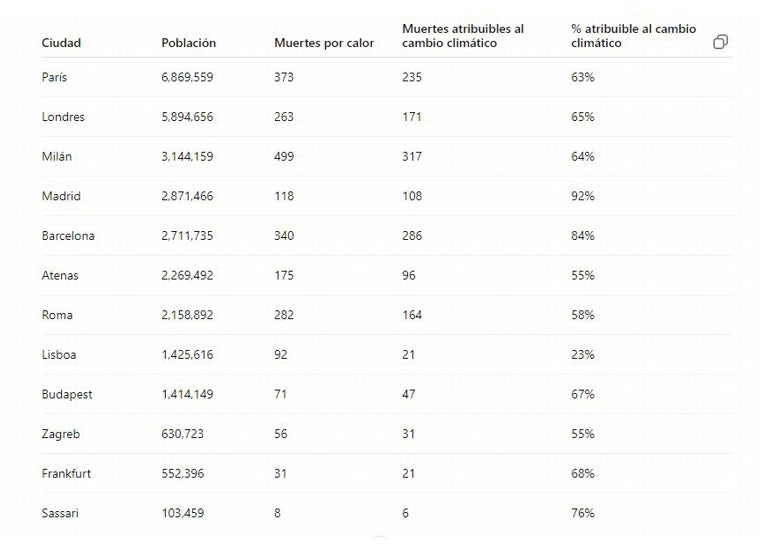The latest heat wave killed nearly 500 people in the cities of Madrid and Barcelona.

Montse, the municipal cleaning worker who died after work , was the first Spaniard to make headlines as a victim of the heat wave that ravaged Europe. She wasn't the only one: a 75-year-old man from Córdoba, a 67-year-old man from Plasencia, and another person from Huesca also died due to the extreme temperatures. And it wasn't just our country: two more people made headlines in Italy for the same reason, and the United Kingdom has now recorded a dozen deaths.
Now, a new study by scientists from Imperial College London and the London School of Hygiene & Tropical Medicine estimates that 2,300 fatalities could be counted in twelve major European capitals, including Madrid and Barcelona. However, the most important aspect of this new study—which has not yet been peer-reviewed—is that 1,500 of them could have been avoided. The clear culprit: climate change, according to the researchers.
The objective was to conduct a preliminary estimate of climate-related deaths during the heat wave that ravaged the European continent, specifically between June 27 and July 2. To do so, they selected twelve representative European cities: London, Paris, Athens, Budapest, Frankfurt, Rome, Zagreb, Lisbon, Sassari, Madrid, and Barcelona.
"Since we can't study hundreds of cities and towns across Europe on a rapid timescale, we selected 12 major cities distributed fairly evenly across the continent, which we hoped would capture a variety of geographies, climates, and cultures, as well as the diverse factors that distinguish each place," says Ben Clarke of the Centre for Environmental Policy at Imperial College.
Once the field of study was defined, the researchers analyzed historical meteorological data provided by World Weather Attribution , an international effort that gathers information on extreme events such as heat waves. They analyzed how intense temperatures would have been in a world that had not warmed by 1.3°C. They also included the conclusions of other studies published in scientific journals, such as one that indicates that between 1991 and 2018, around 30% of repeated deaths could be attributed to climate change; or another recent study that estimated that of the 60,000 deaths that occurred in the summer of 2022, just over 50% could be attributed to climate change.
According to their estimates based on all this data, a total of 2,300 deaths occurred during the recent heat wave, of which 1,500 were a direct result of climate change. By city, Milan tops the list, with 499 deaths, 317 of which are attributable to climate change. In other words, had the abnormal temperature rise not occurred, three-thirds of the victims could have been saved. Barcelona is second, with 340 deaths due to high temperatures, although 286 were attributable to heat. The researchers point to the case of Madrid as worrying, where of the 118 deaths from the heat wave, 108 were due to global warming.
 Estimated deaths attributed to the heat wave in Europe from June 27 to July 2 according to the study
ABC
Estimated deaths attributed to the heat wave in Europe from June 27 to July 2 according to the study
ABC
"Wave temperatures have increased more in Madrid compared to other cities, due to its distance from the coast, among other factors," says Friederike Otto, a researcher at Imperial College London and author of the study. "However, our work has found that climate change is causing heat waves with temperatures between 2 and 4 degrees Celsius higher in all European regions. This translates into deaths and demonstrates why it is so important to take climate change more seriously."
Furthermore, the study points out that the most affected people are those over 65, many of whom suffer from underlying health conditions, such as heart disease, diabetes, and respiratory problems. The results also highlight how heat is an underestimated threat: most heat-related deaths go unreported, and official government estimates can take months to be published or never be published at all. "Studies like this are a very useful tool that can also be refined with subsequent official data," the authors note. "In a few weeks, we will see results, although we suspect they may have been biased conclusions."
Researchers point out that policies such as public awareness and warnings about the dangers of heat waves, as well as the creation of green spaces and climate shelters, could be key to mitigating the problem. "Heat warnings, as well as heat adaptation plans, have improved over time, especially in Europe, in several cities," says Pierre Masselot, a researcher at the London School of Hygiene & Tropical Medicine. "And that in itself can play an important role."
However, the authors point out that these practices will be useless if the burning of fossil fuels and deforestation do not decrease. "This study highlights a simple fact: burning more oil, coal, and gas will kill more people," notes Pierre Masselot, a researcher at the London School of Hygiene & Tropical Medicine. "The only way to prevent heat waves in Europe from becoming even more deadly is to stop burning fossil fuels. Switching to renewable energy, building cities that can withstand extreme heat, and protecting the poorest and most vulnerable is absolutely essential to saving thousands of lives each year."
ABC.es




